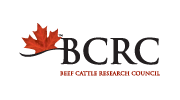Using genetic algorithms to predict antibiotic resistance levels in Canadian feedlot cattle to promote individual animal diagnosis and prevent unnecessary antibiotic use.
| Project Code: | POC.01.19 |
| Completed: | In Progress. Results expected in 2020. |
Project Title:
Rapidly and accurately identifying antimicrobial resistant Mycoplasma bovis in feedlot cattle
Researchers:
Dr. Matthew Links (University of Saskatchewan)
Dr. Murray Jelinski (Western College of Veterinary Medicine)
Objective:
To identify the set of biomarkers that can track antimicrobial resistance in Mycoplasma bovis using a genetic algorithm
Background:
With changing regulatory and market requirements, the beef industry is facing increasing scrutiny regarding antimicrobial use for prevention, metaphylaxis, and treatment.Antimicrobials are critical to ensure the health, welfare and productivity of cattle exposed to bovine respiratory disease. However, current laboratory diagnostic support for prophylaxis, metaphylaxis, to inform appropriate and timely treatment is inadequate. M. bovis is just one of the bacteria found in cattle diagnosed with BRD, but it can also cause other serious impacts, including Chronic Pneumonia and Polyarthritis Syndrome (CPPS). CPPS is not only economically significant, but also results in significant welfare issues due to extreme lameness. There is no effective vaccine against M. bovis despite exhaustive efforts, making early detection and treatment even more crucial for cattle management. Although it is currently possible to test for antibiotic resistance in M. bovis, the current method of culturing takes days to weeks, is costly, and requires specialized sampling materials.
What they will do:
This project will build on previous work around point of care diagnosis. Researchers have developed an algorithm that may help efforts to genetically screen for AMR resistance in M. bovis. These researchers will screen M. bovis samples collected from sick and healthy cattle from the past 10 years and test whether the new algorithm can accurately predict and identify DNA sequences that are likely to be associated with AMR.
Implications:
This work will be essential in advancing the beef feedlot production diagnostic support towards the realm of “pen-level precision medicine” – to make informed treatment decisions for each individual animal production group. These improvements are critically needed to maintain consumer confidence in beef quality and safety, address antimicrobial stewardship requirements, meet end-user needs and maintain global market access.








